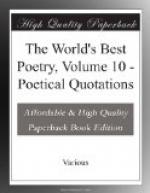The people are the city.
Coriolanus, Act iii. Sc. 1. Shakespeare.
Ah, what can ever be more stately and
admirable to me
than
mast-hemmed Manhattan?
River and sunset and scallop-edged waves
of flood-tide?
The sea-gulls oscillating their bodies,
the hay-boat in the
twilight,
and the belated lighter?
Crossing Brooklyn Ferry. W. Whitman.
A mighty mass of brick, and smoke, and
shipping,
Dirty and dusty, but as wide
as eye
Could reach, with here and there a sail
just skipping
In sight, then lost amidst
the forestry
Of masts; a wilderness of steeples peeping
On tiptoe through their sea-coal
canopy;
A huge, dun cupola, like a foolscap crown
On a fool’s head—and
there is London Town,
Don Juan, Canto X. Lord Byron.
On the AEgean shore a city stands,
Built nobly, pure the air, and light the
soil,
Athens, the eye of Greece, mother of arts
And eloquence, native to famous wits,
Or hospitable, in her sweet recess,
City or suburban, studious walks and shades;
See there the olive grove of Academe,
Plato’s retirement, where the Attic
bird
Trills her thick-warbled notes the summer
long.
Paradise Regained, Bk. IV. MILTON.
I stood in Venice, on the Bridge of Sighs;
A palace and a prison on each hand:
I saw from out the wave her structures
rise
As from the stroke of the enchanter’s
wand;
A thousand years their cloudy wings expand
Around me, and a dying glory smiles
O’er the far times, when many a
subject land
Looked to the winged Lion’s marble
piles.
Where Venice sate in state, throned on
her hundred isles!
Childe Harold, Canto IV. LORD BYRON.
In Venice, Tasso’s echoes are no
more.
And silent rows the songless gondolier;
Her palaces are crumbling to the shore,
And music meets not always now the
ear.
Childe Harold, Canto IV. LORD BYRON.
O Rome! my country! city of the soul!
The orphans of the heart must turn to
thee,
Lone mother of dead empires!
* * * * *
The Niobe of nations! there she stands,
Childless and crownless, in her voiceless
woe;
An empty urn within her withered hands,
Whose holy dust was scattered long ago.
Childe Harold, Canto IV. LORD BYRON.
CLERGY.
He ’stablishes the strong, restores
the weak,
Reclaims the wanderer, binds the broken
heart.
The Timepiece: The Task, Bk. II.
W. COWPER.
Do not, as some ungracious pastors do,
Show me the steep and thorny way to Heaven,
Whilst, like a puffed and reckless libertine,
Himself the primrose path of dalliance
treads,
And recks not his own rede.
Hamlet, Act i. Sc. 3. SHAKESPEARE.




